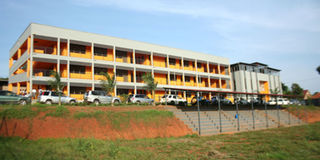Widows build Shs3 billion school for HIV orphans

The Luiggi Giussani High School in Kireka, a Kampala suburb, which was constructed using funding from an association of widows from Naguru, Kireka, Kasokoso and Banda. photo By STEPHEN OTAGE
What you need to know:
The school, which was built using money generated from beads, has a student population of 700 children
KAMPALA
Acheng Karamela, 59, is an HIV positive widow living in Acholi Quarters in Kireka, Kira Town Council.
She is a mother of five, three of whom died of HIV related illnesses, living behind 23 grandchildren in her care.
Some of these children have been working in a stone quarry to raise money for household items including salt, soap, salt and paraffin.
Acheng painfully remembers how her children ended up being prostitutes and vagabonds because they could not afford to go to school.
In 2002, Acheng met Rose Busingye, the chief executive officer, Meeting Point International, who brings together helpless widows to get involved in functional adult literacy classes and thought craftwork.
“Today, the stigma has declined. I own a six bedroom house and I am a landlord with access to money anytime and all my grandchildren are in school,” she says.
Acheng’s story and testimonies from her 2,000 colleagues is the glue that binds HIV positive widows together.
Having been displaced by the 20-year LRA war in northern Uganda, the widows have gone against a number of odds turning their plight into a common cause.
They have used the little resources to construct a secondary school intended to offer education to orphans.
Located in Kamuli in Kireka, a Kampala suburb, Luiggi Giussani High School is valued at about Shs3.5b.
The money was 90 per cent raised by the group of widows assisted by donors.
On Sunday, DHL staff and Rotarians from the Rotary Club of Bukoto, seemed disappointed that they were donating books to an already affluent school but were humbled by the story behind the school.
John Makoha, the country director, Association of Volunteers in International Service [AVSI], says the four-year-old school is a product of 48,000 paper beads which the widows made and exported to Italy.
“These women had the desire to give their children good quality education but they did not have school fees. They made 48,000 paper beads which we helped them market in Italy and Europe,” he says.
AVSI foundation, he explains donated the land for the school and bought each bead from the widows at Shs5,000, which were then shipped to Italy where they found volunteers to sell each bead between Shs50,000 and Shs65,000 [15 and 20 Euros respectively]
Today, the school is home to 700 orphans most of whom were born with HIV/Aids to parents who lived in Kasokoso, Banda, Kireka and Naguru.
Arnold Odong, a 17-year-old student at the school, told Daily Monitor he never had an opportunity to see his father much as they had problems at home, at least he is sure he has people who will listen to his problems and offer solutions while at school.




